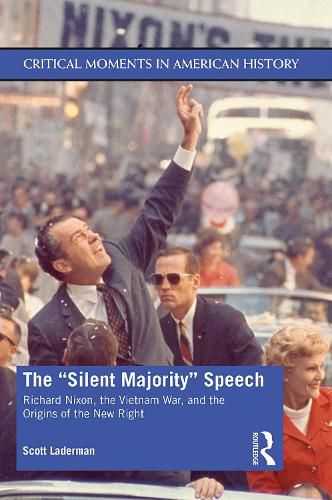Readings Newsletter
Become a Readings Member to make your shopping experience even easier.
Sign in or sign up for free!
You’re not far away from qualifying for FREE standard shipping within Australia
You’ve qualified for FREE standard shipping within Australia
The cart is loading…






The Silent Majority Speech treats Richard Nixon’s address of November 3, 1969, as a lens through which to examine the latter years of the Vietnam War and their significance to U.S. global power and American domestic life.
The book uses Nixon’s speech - which introduced the policy of Vietnamization and cited the so-called bloodbath theory as a justification for continued U.S. involvement in Southeast Asia - as a fascinating moment around which to build an analysis of the last years of the war. For Nixon’s strategy to be successful, he requested the support of what he called the great silent majority, a term that continues to resonate in American political culture. Scott Laderman moves beyond the war’s final years to address the administration’s hypocritical exploitation of moral rhetoric and its stoking of social divisiveness to achieve policy aims. Laderman explores the antiwar and pro-war movements, the shattering of the liberal consensus, and the stirrings of the right-wing resurgence that would come to define American politics.
Supplemental primary sources make this book an ideal tool for introducing students to historical research. The Silent Majority Speech is critical reading for those studying American political history and U.S.-Asian/Southeast Asian relations.
$9.00 standard shipping within Australia
FREE standard shipping within Australia for orders over $100.00
Express & International shipping calculated at checkout
The Silent Majority Speech treats Richard Nixon’s address of November 3, 1969, as a lens through which to examine the latter years of the Vietnam War and their significance to U.S. global power and American domestic life.
The book uses Nixon’s speech - which introduced the policy of Vietnamization and cited the so-called bloodbath theory as a justification for continued U.S. involvement in Southeast Asia - as a fascinating moment around which to build an analysis of the last years of the war. For Nixon’s strategy to be successful, he requested the support of what he called the great silent majority, a term that continues to resonate in American political culture. Scott Laderman moves beyond the war’s final years to address the administration’s hypocritical exploitation of moral rhetoric and its stoking of social divisiveness to achieve policy aims. Laderman explores the antiwar and pro-war movements, the shattering of the liberal consensus, and the stirrings of the right-wing resurgence that would come to define American politics.
Supplemental primary sources make this book an ideal tool for introducing students to historical research. The Silent Majority Speech is critical reading for those studying American political history and U.S.-Asian/Southeast Asian relations.